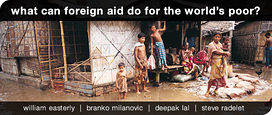Milanovic must live on another planet if he thinks that China and India in pursuit of a multi-polar world will promote a Tobin tax. Having been involved with policy discussions in these two countries for the last few decades, the Tobin tax has never been and is still not even on their distant horizon. I am afraid, painful as it must be for idealists like Milanovic to accept, the world’s great powers are still moved by their national interests, and given their growing weight in the global economies, these emerging giants like the US will be unwilling to have their financial transactions taxed and handed over to some international agency. If he thinks Brazil is moved by a cosmopolitan morality, let him suggest that Brazil agree to a world tax on commodities to be handed to the UN for cash grants to the poor. Unless Brazil has changed radically since I worked there in the 1980s he is likely to get short shrift for such a proposal.
As regards his proposal to hand cash grants to the deserving poor from Angola to Zimbabwe, who is going to be getting these cash grants to these intended beneficiaries? World Bank apparatchiks? Humanitarian activists and NGOs? If they can’t get food and medicines to the hungry and sick because of local government impediments, does he seriously believe these foreign agents carrying their sacks of dollars will be able to hand out their $100 to each targeted family without it being ‘misappropriated’ by local government agents?
On migration, the central question is: would Milanovic support unrestricted migration into the developed world by the world’s poor? Instead of selecting legal migrants by their skills, would he advocate that they be selected instead by their relative poverty? If not, why not, given the universal moral code he espouses in favor of a global welfare state? If he does not advocate this because of political constraints why does he feel free to ignore them in his advocacy of a global welfare state?
His statement that the 19th century globalization “ended in self-induced imperialist carnage,” is wrong in the use of the adjective ‘imperialist’. Even if he doesn’t want to read my book on empires, he should at least read the work of serious historians who long ago refuted the Leninist thesis about the imperialist origins of the First World War, which no doubt Milanovic remembers from school. As a start I would recommend Niall Ferguson’s excellent The Pity of War.

